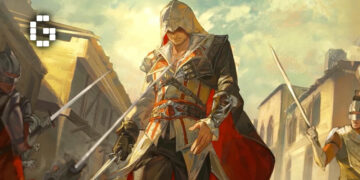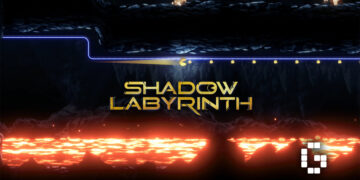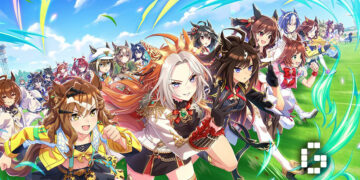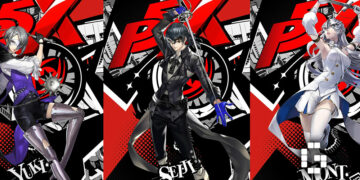In a gaming landscape saturated with fantasy RPGs, Metaphor: ReFantazio emerges not just as another entry in the genre, but as a bold statement from the creative minds behind the Persona series. Our Metaphor ReFantazio review explores Atlus’ Studio Zero’s debut IP, which delivers a captivating fantasy RPG experience.
After eight years of anticipation since its mysterious announcement as PROJECT Re FANTASY, Studio Zero’s debut title finally arrives to prove that some dreams are worth the wait. This isn’t just Atlus dipping their toes into traditional fantasy—it’s them diving headfirst into uncharted waters, armed with their signature style and decades of RPG craftsmanship.
Story
The game opens with an interesting intro that asks us a question about the limitations of a fantasy work before asking for your name. Not for the protagonist you’re about to play, but your actual real name. Some might associate it with some sort of 4th wall break moment although we ourselves see it as an important component of Metaphor’s premise, especially in the story, because this is a game that sees our real world as a utopia or fantasy paradise where everyone can live in peace without discrimination. We (the players) are well aware that the real world is not as beautiful as the game portrays, so seeing the story from this perspective really gives a unique experience.

Set in the United Kingdom of Euchronia, this is a land inhabited by eight tribes with different standing, where the protagonist comes from the Elda tribe which has the worst reputation in the entire country and is considered as a complete outcast. Even so, the protagonist turns out to have a close relationship as a childhood friend of the royal prince who is suffering from a curse and getting closer to his death with each passing day. With the conspiracy that led to the king’s death, Euchronia is on the verge of a major change where who can seize power will decide the fate of the entire kingdom.
This power couldn’t be taken so easily, as the king had ensured that his death would trigger Royal Magic, an absolute magic that forced the entire population of Euchronia into a tournament for the position of king. Each candidate must earn the trust of the people and any attempts to kill each other to lessen the competition will be useless, as the king’s magic will protect the highest-ranking candidates from death.

Despite coming from the world’s least reputable and rarest tribe, this doesn’t stop our protagonist from getting involved in the tournament to become king, as he has a primary mission to save the prince and secure the power to the best candidate. This is because the protagonist and the prince have the ambition to create a world like the one described in their favorite novel, a world without conflict where everyone has equality. From here you’ll embark on a grand adventure across the kingdom of Euchronia, gathering followers, engaging in unexpected conflicts, and recruiting comrades-in-arms who share the same ambitions.
This approach to world-building is handled very well, as each tribe in the game has a strong relevance where you can delve deeper into their history, the fate they face compared to other races, and their unique characteristics beyond their looks. This is especially explored through the game’s Follower system, which allows you to form strong bonds with party members and important supporting characters from different tribes. So in addition to following the side stories of each of these characters and helping them grow stronger as an individual, you’ll get a deeper look into the world of Metaphor: ReFantazio that was not explored enough in the main storyline.

Aside from the intro/prologue portion, which in our opinion is still too long and requires patience until you can truly get the feel of the game, Metaphor: ReFantazio’s story is very engaging and combined with ambitious world building that is always interesting to explore further. We also didn’t feel like there was a moment where the game immediately became stale, because as the tournament progresses, the atmosphere of competition will continue to heat up and take you on an increasingly interesting adventure to embark. Not to forget how much the setting is tied to the real world, especially how in the Metaphor: ReFantazio’s universe, there is a threat coming from horrifying monsters called “human” that certainly makes you curious about its true origins.
Huge Appeal on the Adventure
Speaking of adventure, it’s arguably one of Metaphor: ReFantazio strongest selling point and what makes the game so special to us. Unlike many games we’ve played, it’s quite remarkable how Metaphor: ReFantazio manages to give us the most immersive adventure sensation even compared to open-world games. This illusion is created by the fact that the game’s progress takes you around the kingdom of Euchronia on a tour to take the tournament’s main trials. On this journey, you and your crew are accommodated with Gauntlet Runner, a giant walking vehicle that can traverse various terrains while acting as your main base.

In the Gauntlet Runner itself, you can do various activities that are important for increasing Royal Virtues, a special stats system that is similar to the social stats system in the Persona series, but the difference here is that each point is an essential qualification for someone to become a king. Every time you do an activity like this, time will pass from morning to night or change to the next day. So on the other hand, as many of you may already know, the game does include a Calendar system where you will spend time from day to day freely.
There are also other things you can do in Gauntlet Runner such as cooking, doing activities to increase your character’s combat stats, and continuing the progress of the Follower’s story, which sometimes requires specific Royal Virtues at higher levels before you can progress the rank further. The time management aspect of the game is therefore quite important, and it’s even more so since you can expect to spend a minimum of one to several days traveling from one location to another. It’s along this journey that you can only spend time in Gauntlet Runner and somehow we manage to feel that sense of immersion.

Whether it’s just looking at the scenery outside while chatting with your companions, to stopping at a campsite before heading back out on the long journey, it’s an experience that we can’t imagine being presented so well in a game that isn’t even open-world. There’s also that rewarding sensation even when simply reach a location you want to go to, because aside from the journey that can be quite time-consuming, sometimes there are unexpected stops either through some kind of boss battle or more relaxed ones such as seeing unique natural phenomena / scenery in several places to then be immortalized in the form of paintings.
An adventure through the kingdom of Euchronia will certainly take you to various regions and cities to explore. Each of these large regions is the main setting for each story arc, with a main dungeon that you need to complete before hitting the deadline because it could lead to a Game Over. There’s a lot more to do in each of these major cities than in Gauntlet Runner, such as how there are various public spots where you can give speeches to residents and other activities to increase your Royal Virtues, stock items and equipment from facilities and shops that also provide Appraisal options to bring out the potential of your special loot, and take bounty missions and other side quests that will lead you to optional dungeons outside the city.

So regardless of whether you’ve completed the main mission of each arc even if it’s far from the deadline, the game always provides plenty of other activities for you to do, especially from completing optional dungeons that always end up being rewarding. This is not only for the sake of completing side missions, but also when you want to strengthen your character, enjoy more combat and boss challenges, and hunt for valuable treasures. The good news is that you can always revisit dungeons that you’ve already completed or perhaps haven’t explored due to time constraints.
The Best of Atlus’ Combat System
But of all the main foundations in Metaphor: ReFantazio, the combat system itself is the most unexpected from our initial impressions, because what it offers here is probably the best combat system from Atlus. The main component that makes it so special is the Archetype system that can be related to Demon or Persona, but the difference here is how Archetypes are manifestations of the power of ancient heroes that come back to life after the main characters manage to face their fears or doubts. This theme is successfully reflected in the fact that each main character can use all the Archetypes in the game, as if they no longer have any doubts in themselves to take on any new powers.

Despite lower quantity and how the design seems to have a monotonous motif, what makes Archetypes so special is in their use as a replacement for the Job system in an RPG. In total, there are more than 40 Archetypes in the game and each one has its own specialization, fighting style with different weapons, and a variety of unique skills. Since each character can use all the Archetypes available, this certainly opens up so much possibility for near limitless experimentation, making the combat in the game never felt boring and always bringing something fresh based on your imagination or strategy. The game also provides a special facility called Akademia where you can explore the potential of Archetypes and upgrade them using Mag (additional currency that you can gain from battles and various other places).
Then how does the combat system as a whole? Metaphor: ReFantazio brings a fairly unique combination of real-time action with classic turn-based. Not the first time in the genre, but there is a more practical use here to make the experience feel more comfortable when in action mode, while at the same time still presenting turn-based gameplay with its own distinctive sensations. It’s just that the action combat of the game is very barebone where you can only lock-on to one enemy while launching several normal attacks to reduce their gauge, which can then provide bonus Stun status effect and damage before transitioning to turn-based mode by pressing the Squad button.

Upon entering the turn-based mode, at first glance, there might not be anything too different, but it won’t be long until you find that what Metaphor has to offer is more complex. The game itself features a Press Turn system where you get an allotment of turns that can continue to be added as long as you successfully launch attacks according to enemy weaknesses or successfully trigger Critical, but of course with a maximum limit. If an attack ends in a Miss from either the party or the enemy, the turn will be switched regardless of the remaining Turn Icon. What makes this system especially challenging in Metaphor: ReFantazio is how you can consume more Turn Icon to execute high-level skills that can be accessed through Synthesis.
Synthesis is a special skill that is the result of a combination of the power of two different Archetypes from each party member, and depending on the Archetype formation you are using, the available skill will also be different. Some of them may seem standard and are not too overpowered, for example, normal support skills such as Matarukaja (increases party Attack) are included in Synthesis skills that consume up to 2 Turn Icon in this game, but with a lower MP payout compared to Shin Megami Tensei or Persona. This doesn’t even touch on higher class skills that can even consume up to 3 Turn Icon, so you really have to be very selective in using every turn in this game. There’s even a Pass Turn feature which can consume Turn Icon if you’re not careful, but still very useful regardless in many situations.

In addition, there is access to the standard skills of each Archetype which is quite enough and even more flexible, because you can add more skills from different Archetypes through the Skill Inheritance feature. So if you build a party that only focuses on DPS without any Support, then you can still cover those shortcomings by filling additional skill slots with skills from the Archetype that each character has learned. This is not only limited to Support skills, but also magic attacks from various elements including the ones that can trigger status effects which you might need in unexpected moments, because the game itself does not allow you to change Archetype in the middle of combat, so there needs to be more preparation before going to face a dungeon.
While some players may see this as a drawback, we actually quite like this approach, as it allows you to focus more on enjoying the combat according to your established formations without having to worry about thinking of new strategies during the actual fun part.
This preparation will also involve buying information from informants in each town, as this is where you can get essential info about the weaknesses of the monsters and bosses that inhabit a dungeon, a more traditional way of playing a fantasy adventure game than just reading enemy weaknesses practically in combat through your Navi character’s skills.

But doesn’t this make Gallica, the game’s main Navi character, kind of useless? The answer is no, because aside from her essential role in the main story, she is especially useful during exploration sessions by utilizing the Fae Sight skill. This skill allows you to see more information from the surrounding area, including enemies to fight and how strong their power levels are. Sorting out which enemies to fight head-on is certainly important, because if you’re careless and end up getting ambushed, then this can be fatal because the ambush in Metaphor tends to be more brutal than other RPGs.
Fortunately, to minimize unwanted scenarios, Metaphor: ReFantazio has implemented a Retry feature where you can restart encounter combat from the beginning. A QoL feature that is indeed unbelievably useful, because you don’t have to bother to keep repeating the previous Save Data to fight a difficult enemy again, not to mention that you can use the first encounter as a test run to see the enemy’s attack pattern while finding its weaknesses, before finally utilizing Retry for a smoother experiment from the beginning especially because any enemy weaknesses that are successfully found will still be saved even if you trigger Retry.

The game’s strategy element is further enriched by the Formation system, where you can freely position each party character to be at the front or back without having to take a turn to execute. Party characters at the front can deal maximum damage but with lower defense, while characters at the back have weaker attacks but higher defense. In addition, sometimes there are skills that require you to place party members in a specific position, be it a healing skill that can only recover characters in the same row or a long-range shooting attack that can only be triggered by placing characters in the back row.
All of this contributes to a combat system that is rich with strategy and room for experimentation, but at the same time remains challenging without being frustrating due to scenarios that might be more common in other RPGs. But of course, there is a clear contrast between the two combat styles, which is that Metaphor: ReFantazio is still a purely turn-based game, while the action side, as we said, is more practical than fun.
Presentation and Technical Aspect
So similar to Atlus games, especially those that come from some of the big names from the Persona team, they still put a big emphasis on the art direction. This can especially be seen from the gorgeous UI design, where Metaphor: ReFantazio features a classic painting style with some abstract elements. They’ve even incorporated this into the game’s world setting, where you can see scenes like the sky, clouds, and distant locations presented like living paintings. This style is made even more unique by the music that melds Buddhist prayers and somehow still fits with the setting.

The UI itself may seem busy or hard to read, but after playing the game we quickly got used to it and were constantly amazed by its unique presentation. Even so, Metaphor: ReFantazio’s attempt at melding these styles doesn’t always hit the mark, and this is especially evident because the game still uses an old base engine compared to Atlus’ recent games that have switched to the Unreal Engine.
This results in a graphical quality that, although it looks great in some places, also feels outdated, especially in the 3D character models to graphic effects that are too sharp unless you played the game in 200% Rendering Scale.

So yeah, we played the game on PC and the performance was arguably less than optimal. In the end we managed to find a workaround that made performance smoother, but still this requires extra steps that the game does not provide, so hopefully this will not be experienced by other players or there is a swift effort from the developer in optimizing it.
The Difference with Shin Megami Tensei and Persona
It feels important for us to include this point, because there is definitely that curiosity about what sets this game apart from Shin Megami Tensei and Persona as Atlus’ new main pillars. Aside from the various things we’ve already covered in this review, the striking difference is certainly in the approach to the main setting and story. If Shin Megami Tensei tends to involve end-of-the-world conflicts with the involvement of godly beings, and how Persona revolves around the lives of high school students who are dragged into some kind of supernatural adventure, then Metaphor: ReFantazio is more of a pure fantasy game that carries heavy themes while incorporating many real-world elements.

We’d also like to return back to the Follower system, which is quite similar to Social Link in Persona. There aren’t as many characters that you can befriend as in Persona and Rank is limited to 8 instead of 10. Even so, every side story of the Follower characters is handled well and none of them ended up being weak for us. The main advantage is in the variety of benefits you can get every time you reach a new Rank, as you can gain access to new Archetypes, add very useful Inheritance Skill slots, and many more that are essential in supporting your adventure. So building connections with these characters even seems mandatory compared to Persona, which is mostly optional.

But what we think is the most essential difference is the difficulty level. Shin Megami Tensei is still the most hardcore of the three, while Persona is lighter and focuses on a stylish combat system. This then leaves Metaphor: ReFantazio which we think fits nicely in the middle, as even on Normal difficulty the game feels more challenging than Persona’s Hard mode, not to mention the combat system is richer in strategy and experimentation.
Verdict
The long wait for Metaphor: ReFantazio ended up being a game that was different from what we imagined when it was originally announced as PROJECT Re FANTASY, but the end result still came out as a distinctive work with the Atlus brand in its efforts to create something unique and not mainstream. While there are indeed strong similarities brought from Atlus’ two big franchises such as Shin Megami Tensei and especially Persona, there are far more of its own characteristics and strong selling points that make Metaphor: ReFantazio so special.

As Studio Zero’s original IP debut that once again presents consistent quality like Katsura Hashino’s previous works, this is a solid first step if they want to explore it further. We do still have some gripes when it comes to the outdated presentation and technical issues for the PC version, but the rest of Metaphor: ReFantazio is a fantastic RPG that is quite rare in the market, let alone one that can provide the most immersive adventure sensation.

Join Us!
We are recruiting! If you want to break into the gaming media industry, don't miss out on the golden opportunity. Find out more: Malaysia. Overseas.Featured Video
The Review
PROS
- Solid main story that is always engaging to follow
- Memorable main and supporting characters
- Awesome UI design and art direction
- Atlus' best combat system yet
- Great music selection with a unique mix of styles
- Incredibly immersive adventure
CONS
- Graphics feels outdated in some places, especially on character models
- The PC version is less optimized and needs workarounds to get better performance











![[EXCLUSIVE] Creative Masterminds from Gearbox Software Reveal What Makes Borderlands 4 Worth the Wait](https://cdn.gamerbraves.com/2025/07/Borderlands-4-at-Bilibili-World-2025_Interview_FI-360x180.jpg)




![[ASIA EXCLUSIVE] Bringing Back a Classic: Inside the Making of FINAL FANTASY TACTICS – The Ivalice Chronicles](https://cdn.gamerbraves.com/2025/06/FFT-Ivalice-Chronicles_Interview_FI2-360x180.jpg)











